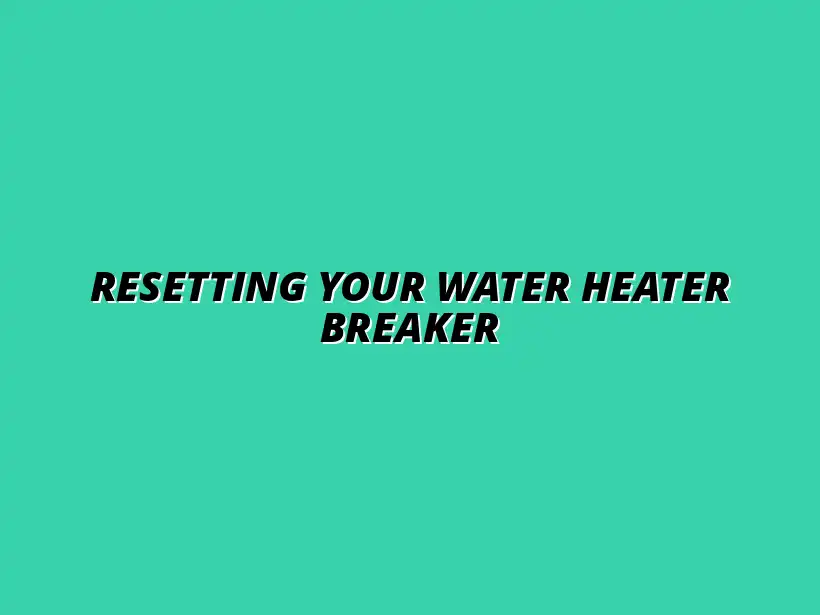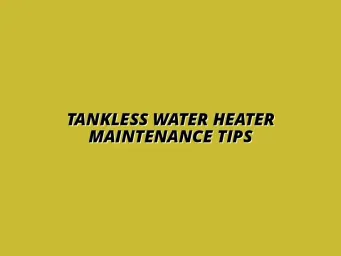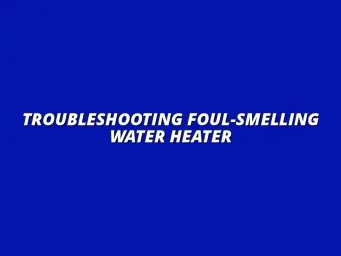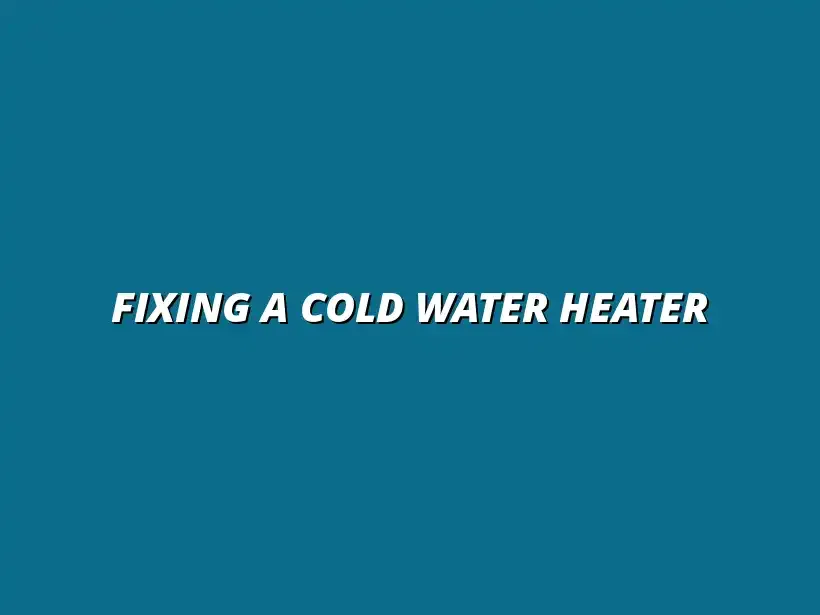
Resetting Your Water Heater Breaker
Understanding the Basics of Water Heater Circuit Breakers
Water heater circuit breakers are essential components of your home's electrical system. They help manage the flow of electricity to your water heater, ensuring safe operation. By understanding how these circuit breakers work, you can troubleshoot issues and keep your water heater running smoothly.
Every time your water heater draws power, it relies on a circuit breaker to regulate the electrical supply. If something goes wrong, such as an overload or a short circuit, the breaker will trip, cutting off power. This is a crucial safety feature that helps prevent electrical fires and damage to your water heater.
The Role of Circuit Breakers in Water Heater Functionality
Circuit breakers play a vital role in the overall functionality of your water heater. They act as a protective barrier, ensuring that your appliance does not draw too much electricity at once, which can lead to overheating and potential hazards. Without a functioning circuit breaker, your water heater could face serious damage or even create a fire risk!
When a water heater operates, it draws a significant amount of electricity. The circuit breaker monitors this demand. If the current exceeds a safe level, the breaker trips to protect both the water heater and your home’s electrical system. This makes it clear just how essential these devices are!
How Circuit Breakers Protect Your Water Heater
The primary function of a circuit breaker is to provide safety. It continuously monitors the electrical current flowing to your water heater. If it detects an abnormal increase in current, the breaker trips, which stops the flow of electricity and prevents overheating.
- **Prevents electrical fires** by stopping excessive current flow.
- **Protects your water heater** from damage due to electrical surges.
- **Ensures safe operation** by automatically shutting off power when necessary.
This automatic response is crucial for avoiding costly repairs and ensuring your home remains a safe environment. Knowing that your circuit breaker is working to protect your water heater can give you peace of mind!
Signs That Your Circuit Breaker May Be Tripped
When a circuit breaker trips, it can show several signs that indicate a problem. Recognizing these signs early can help prevent further issues with your water heater. Common symptoms include:
- **Loss of hot water**: Your water heater may stop producing hot water altogether.
- **Breaker switch is in the off position**: The switch will visibly show if it has tripped.
- **Burning smell**: Any unusual smells can indicate a serious issue!
Being aware of these signs lets you act quickly and address the issue before it escalates. If you notice any of these symptoms, it's essential to take action immediately. For more in-depth guidance on maintaining your water heater efficiently, check out these maintenance tips.
Common Causes of a Tripped Water Heater Circuit Breaker
Understanding what causes your water heater circuit breaker to trip can save you time and frustration. Several factors can lead to this issue, primarily revolving around electrical and mechanical problems. By identifying these causes, you can take preventive measures to avoid future trips.
Some of the common reasons include overload problems, short circuits, and mechanical failures. Each of these causes can lead to a breaker trip, affecting your water heater's performance and safety. Recognizing these triggers can help you maintain your water heater effectively.
Electrical Issues That Trigger Breaker Trips
Electrical problems are one of the leading causes of a tripped breaker. These issues can arise from various sources, including overloaded circuits and faulty wiring. Understanding these common electrical triggers can help you keep your water heater running without interruption.
- **Overload Problems**: When too many devices draw power from the same circuit, it can overwhelm the breaker.
- **Short Circuits**: These occur when a live wire touches another wire or a grounded surface, causing an immediate spike in current.
- **Faulty Wiring**: Old or damaged wires can create resistance and lead to unexpected breaker trips.
Addressing these electrical issues early can prevent serious failures and ensure that your water heater continues to operate efficiently! If you're experiencing a tripping water heater, you can find helpful repair guides here.
Overload Problems: When Too Many Devices Are Connected
Overloading occurs when multiple appliances are connected to a single circuit. This situation can draw more power than the circuit can handle, causing the breaker to trip. To avoid overloads, be mindful of how many devices are plugged into the same circuit.
- **Limit the number of high-wattage devices** on the same circuit as your water heater.
- **Use separate circuits** for high-demand appliances whenever possible.
- **Consider upgrading your circuit** if you frequently experience trips due to overload.
Taking these steps helps ensure that your water heater operates smoothly and safely without interruptions!
Short Circuits and Their Impact on Water Heater Safety
Short circuits are serious conditions that can lead to immediate breaker trips. They occur when the electrical path becomes too direct, creating a surge of current. This can happen due to damaged wiring or malfunctioning components within the water heater.
Knowing the signs of a short circuit can help you act quickly. If you hear buzzing noises, see sparks, or notice any burning smells, it's essential to turn off the power immediately and seek professional help. Ignoring these signs can lead to severe consequences!
Addressing Frequently Asked Questions About Water Heater Circuit Breakers
When it comes to water heater circuit breakers, many homeowners have questions that stem from confusion or lack of understanding. It’s important to clear up these common misconceptions to ensure that your water heater functions efficiently and safely. By addressing these FAQs, you can take charge of your water heater's maintenance and troubleshoot issues more effectively.
Understanding the nature of circuit breakers is key. They are designed to protect your home from electrical overloads and short circuits, but many people may not fully grasp how they operate or what certain terms mean. So, let's dive into the specifics!
Common Misconceptions About Circuit Breakers
One common misconception is the difference between a tripped breaker and a blown breaker. A tripped breaker can easily be reset, while a blown breaker typically indicates a more serious issue that may require replacement. Understanding this difference can save you time and unnecessary frustration.
If your breaker keeps tripping even after resetting, it’s crucial to investigate further. This could indicate a persistent problem like short circuits or overloads, which might need a professional to address. Don't ignore continuous trips; they can lead to larger issues down the line!
- Tripped breakers can often be reset manually.
- Blown breakers usually require replacement.
- Continuous trips are a sign of an underlying electrical issue.
Understanding the Difference Between Tripped and Blown Breakers
A tripped breaker is simply a safety mechanism that shuts off power to prevent overheating or potential fires. When you flip the switch back to the “on” position, it should work again unless there’s a deeper issue. On the other hand, a blown breaker indicates more serious damage, often requiring a total replacement. For information on regular checks, see our advice on regular bathroom water heater checks.
Recognizing these differences can help you make informed decisions about your water heater and electrical system. If you ever feel uncertain, don't hesitate to consult a professional for guidance!
What to Do if the Breaker Keeps Tripping Despite Resets
If your circuit breaker repeatedly trips, take the following actions:
- Unplug other devices: Reduce the load on the circuit to see if that helps.
- Inspect for visible damage: Check the wires and connections for frays or burns.
- Monitor your water heater: Look for leaks or unusual sounds coming from the unit. If you discover a leak, you may need to consult a guide on repairing a leaking water heater pipe.
If these steps do not resolve the issue, it’s time to call in a professional electrician. They can safely diagnose and fix any underlying problems within your electrical system.
Best Practices for Homeowners with Electric Water Heaters
Maintaining an electric water heater requires a proactive approach, and creating a maintenance schedule is crucial. This not only helps keep your unit running efficiently but also minimizes the risk of trips and other problems. Regular check-ups can catch minor issues before they escalate into bigger headaches!
Here are some key best practices to consider:
- Schedule annual inspections by a qualified technician.
- Check the temperature settings on your water heater regularly.
- Flush the tank annually to remove sediment build-up. Learn how to easily flush your water heater.
Creating a Maintenance Schedule for Your Water Heater
Creating a maintenance schedule can be straightforward. Set reminders for inspections and flushes throughout the year. Keeping track of these tasks ensures your water heater remains in top shape and helps identify potential issues early!
Don’t forget to write down any observations during these maintenance checks so you can reference them over time. This way, you’ll be more informed should problems arise in the future.
Key Signs of a Failing Water Heater That Require Attention
Watch for these warning signs that may indicate your water heater is failing:
- Strange noises: Banging or popping sounds can signal sediment build-up.
- Rusty water: Discolored water can mean corrosion inside the tank.
- Inconsistent temperatures: Fluctuating temperatures may point to heating element issues.
If you notice any of these signs, consider taking immediate action. Addressing them early can save you from costly repairs later!
Final Thoughts on Managing Water Heater Circuit Breaker Issues
Managing water heater circuit breaker issues doesn’t have to be overwhelming. By understanding key concepts and knowing what to do in various situations, homeowners can feel more confident. Remember, safety is paramount, and knowing when to seek professional help is essential.
Maintaining your water heater properly can significantly reduce the likelihood of circuit breaker trips. With a proactive approach, you can enjoy efficient hot water service without frequent interruptions!
Recap of Key Steps in Handling a Tripped Breaker
In summary, when dealing with a tripped breaker, follow these key steps:
- First, ensure your safety by turning off the power.
- Check for obvious issues such as overloads or damage.
- Reset the breaker after assessing the situation.
- If problems persist, contact a professional electrician for help. For emergency plumbing services, you can find a plumber in Drifford, Birmingham.
Your safety and the proper functioning of your water heater should always come first. Don't hesitate to reach out for help when needed!
Emphasizing Safety and Professional Assistance When Necessary
Safety is paramount when working with electricity. Always prioritize your well-being and don’t take unnecessary risks. Remember, calling a professional can save you time, effort, and potential accidents!
It's better to be safe than sorry, so keep your electrical systems in top shape!
Encouraging Proactive Measures for Homeowners
As a homeowner, it's important to be proactive about water heater maintenance. Engaging with local electricians can provide you with valuable insights tailored to your specific needs. Don’t shy away from asking questions; they are there to help! For unclogging drains, check out these tips on unclogging your bathroom drain.
Also, consider sharing your own experiences and tips with others in your community. This exchange of information can empower others while creating a supportive network for problem-solving together!
Engaging with Local Electricians for Expert Advice
Building a relationship with local electricians can be incredibly beneficial. They can offer advice tailored to your unique water heater model and home setup. Regular consultations can help you stay informed about best practices!
Don’t wait for problems to arise before reaching out. An informed homeowner is a prepared homeowner!
Sharing Experiences and Tips with the Community
Finally, engaging with your community about water heater issues can be enlightening. Sharing your experiences can help others who might be facing similar issues. Together, we can learn and grow!
Consider joining local forums or social media groups focused on home maintenance. You never know how your story might help someone else!




